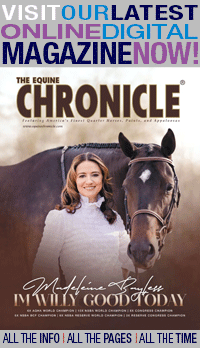Dental Care for Old and Young Horses
Click here to read the complete article178 – November/December, 2016
by Heather Smith Thomas
 Most horses need dental care periodically. Domestic horses are usually kept in artificial conditions, eating grain and hay rather than grazing continually at pasture, and may not wear their teeth normally. Dental care is part of good horse management, and older horses often need more frequent check-ups and attention than younger horses— although young growing horses have their own set of teeth problems.
Most horses need dental care periodically. Domestic horses are usually kept in artificial conditions, eating grain and hay rather than grazing continually at pasture, and may not wear their teeth normally. Dental care is part of good horse management, and older horses often need more frequent check-ups and attention than younger horses— although young growing horses have their own set of teeth problems.
OLDER HORSES – Claudia True, DVM (Woodside Equine Clinic, Ashland, Virginia, past president of the Virginia Veterinary Medical Association), says one of the biggest problems with older horses is loss of teeth. “The horse’s teeth continually erupt from the jaw and eventually come to the end of the root. There is nothing left to grind with. This is a good problem, because it means our horses are living a lot longer than they were in the past. When the horse runs out of teeth we have to deal with this situation, but feed companies have products that work well for these older horses with no teeth,” she says.
“Sometimes, however, the horse may become uncomfortable before that point, if he has a loose tooth. Some of these teeth are very loose and can be removed easily, while others require more work to extract,” she says.
Spaces between loose teeth may become a problem if feed gets packed in there. “This can lead to periodontal disease. If this happens in the upper cheek teeth, sometimes infection moves upward to the root and creates a sinus infection in older horses. There are several factors leading to loose teeth, but periodontal disease can be one,” says True.
Some of the infections that might occur, including sinusitis, are more commonly seen in horses that have Cushings, since their immune system is compromised. These horses need frequent and proper dental care to try to prevent or treat potential teeth infections. “Sinus infections in general are not very easy to clear up, and if the horse is immune compromised it makes this even more difficult,” she explains.
There are several reasons to check the teeth often in an older horse. True usually recommends checking them every 6 to 12 months, depending on the individual, to make sure problems can be identified early before they become serious. “If the horse is packing feed between the teeth there may be some things we can do to resolve this. I may also have the owner flush the mouth periodically and pay attention to how the horse is chewing so that if anything changes they can call me out before the next scheduled exam,” she says.
If there are spaces between the teeth on the top rows, opposing teeth on the bottom won’t match up perfectly for even wear—and there may be portions of those teeth that erupt up farther and become tall, moving into the opposing space. “We may have to reduce a portion of the tall tooth, and sometimes this will allow the space to heal and the teeth to come back together again. In older horses this may become more complicated and problematic because they are running out of teeth. Sometimes we need to clean up those periodontal pockets, pack them with antibiotic and put some dental impression material over it—to keep feed from packing in there and allow it to heal,” says True.
Click here to read the complete article178 – November/December, 2016










